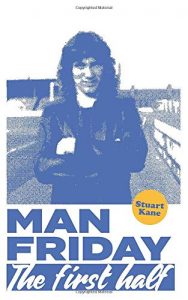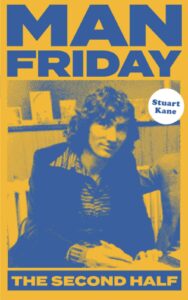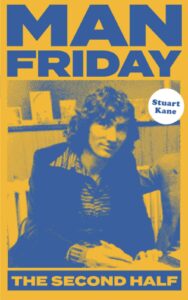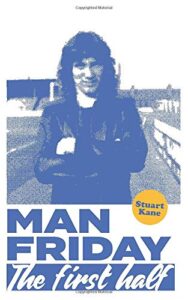 This is the second part of Stuart Kane’s work on the ex-Reading and Cardiff City player Robin Friday. The first book was reviewed by FBR back in September 2020 and can be found here.
This is the second part of Stuart Kane’s work on the ex-Reading and Cardiff City player Robin Friday. The first book was reviewed by FBR back in September 2020 and can be found here.
Kane starts this second-half, picking up from the end of the first instalment in the summer of 1976, with Reading having been promoted from the Fourth Division and awaiting the new season and life in the Third Division. It sees the players including Robin Friday in dispute with the club over pay. However, he starts the season at Elm Park, before a transfer to then Second Division Cardiff City in December 1976, where he sees out the 1976/77 campaign but then makes only two league appearances the following season before retiring from the professional game.
 Stylistically the book continues in its biographical fiction form as Kane once more combines real-life events and fictional narrative to get inside the head of Robin Friday. However, there is a distinct difference in focus which derives from all that was happening in Friday’s life. In the first book, covering his playing career during the 1973/74, 1974/75 and 1975/76 campaigns, readers get more detail around the mercurial player and his time at Reading on the pitch. Here in the second book, over the following three seasons, Friday makes just half the number of appearances as he did in his first three years as a professional with Friday’s life off the pitch now the dominant force. The joy of playing that was evident in the first book is plainly missing here in the second as Kane conveys to the reader how drug addiction and drinking came to take over Robin’s life. Apart from his dazzling debut for Cardiff against Fulham, in which he outplays former England captain Bobby Moore, the football detailed in this second instalment feels like a struggle for Friday as he fights against a body wracked by the ruthless challenges of brutal opponents and its cravings for the next fix.
Stylistically the book continues in its biographical fiction form as Kane once more combines real-life events and fictional narrative to get inside the head of Robin Friday. However, there is a distinct difference in focus which derives from all that was happening in Friday’s life. In the first book, covering his playing career during the 1973/74, 1974/75 and 1975/76 campaigns, readers get more detail around the mercurial player and his time at Reading on the pitch. Here in the second book, over the following three seasons, Friday makes just half the number of appearances as he did in his first three years as a professional with Friday’s life off the pitch now the dominant force. The joy of playing that was evident in the first book is plainly missing here in the second as Kane conveys to the reader how drug addiction and drinking came to take over Robin’s life. Apart from his dazzling debut for Cardiff against Fulham, in which he outplays former England captain Bobby Moore, the football detailed in this second instalment feels like a struggle for Friday as he fights against a body wracked by the ruthless challenges of brutal opponents and its cravings for the next fix.
This second instalment portrays a man in turmoil, who battles with himself in terms of his demons. A lost career and the dreams of playing First Division football, the failed marriages, the ignominy of run-ins with the law, the flare-ups on and off the pitch, all leading to a sad conclusion in an early death.
That Robin Friday was a talented player there is no doubt as testified by those that managed and played with him. However, in addition, he was undoubtedly also a complicated character. Kane captures both his playing genius and his struggles, the highs on the pitch and his lows away from it with the two books reflecting that dichotomy. Kane wanted to provide a read that captured and was true to the spirit of Robin Friday. This he has done in a game of two halves, and leaves readers to imagine what might have been.
(Helpston Fuller. November 2020. Paperback 314 pages)
 It is July 1976 and Robin Friday is now a Third Division footballer, but he still dreams of reaching the top of his profession.
It is July 1976 and Robin Friday is now a Third Division footballer, but he still dreams of reaching the top of his profession. Robin Friday dreams of being a professional footballer: rejection, drugs, borstal, and a near-fatal industrial accident won’t stop him.
Robin Friday dreams of being a professional footballer: rejection, drugs, borstal, and a near-fatal industrial accident won’t stop him. This is the second part of Stuart Kane’s work on the ex-Reading and Cardiff City player Robin Friday. The first book was reviewed by FBR back in September 2020 and can be found
This is the second part of Stuart Kane’s work on the ex-Reading and Cardiff City player Robin Friday. The first book was reviewed by FBR back in September 2020 and can be found  Stylistically the book continues in its biographical fiction form as Kane once more combines real-life events and fictional narrative to get inside the head of Robin Friday. However, there is a distinct difference in focus which derives from all that was happening in Friday’s life. In the first book, covering his playing career during the 1973/74, 1974/75 and 1975/76 campaigns, readers get more detail around the mercurial player and his time at Reading on the pitch. Here in the second book, over the following three seasons, Friday makes just half the number of appearances as he did in his first three years as a professional with Friday’s life off the pitch now the dominant force. The joy of playing that was evident in the first book is plainly missing here in the second as Kane conveys to the reader how drug addiction and drinking came to take over Robin’s life. Apart from his dazzling debut for Cardiff against Fulham, in which he outplays former England captain Bobby Moore, the football detailed in this second instalment feels like a struggle for Friday as he fights against a body wracked by the ruthless challenges of brutal opponents and its cravings for the next fix.
Stylistically the book continues in its biographical fiction form as Kane once more combines real-life events and fictional narrative to get inside the head of Robin Friday. However, there is a distinct difference in focus which derives from all that was happening in Friday’s life. In the first book, covering his playing career during the 1973/74, 1974/75 and 1975/76 campaigns, readers get more detail around the mercurial player and his time at Reading on the pitch. Here in the second book, over the following three seasons, Friday makes just half the number of appearances as he did in his first three years as a professional with Friday’s life off the pitch now the dominant force. The joy of playing that was evident in the first book is plainly missing here in the second as Kane conveys to the reader how drug addiction and drinking came to take over Robin’s life. Apart from his dazzling debut for Cardiff against Fulham, in which he outplays former England captain Bobby Moore, the football detailed in this second instalment feels like a struggle for Friday as he fights against a body wracked by the ruthless challenges of brutal opponents and its cravings for the next fix.